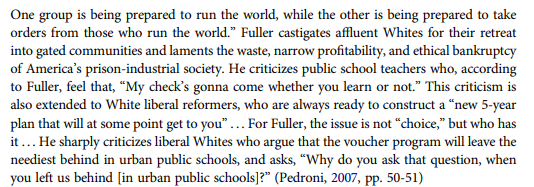For @josc_official's special issue on Populism and School Choice, I wrote about populism as a "discursive frame" and school choice politics in the U.S. Please give it a read and share your thoughts! Here is a thread w/ some key points in my argument: 1/10 https://www.tandfonline.com/eprint/ZXGWJPYBQS4AJRIQINBX/full?target=10.1080/15582159.2020.1853993
I use @parisaslanidis's definition of populism as a discursive frame--a political discourse that constructs a "people" in an antagonistic relationship with "the elites". It's about the rhetoric more than the specific issue, positions, actors, or tactics. 2/10
For school choice, this definition of populism points us towards the politics surrounding it. The policies are not inherently populist or elitist. So, to what extent (how strongly or weakly) has school choice been framed in a populist way? 3/10
I argue: the politics of school choice in the contemporary reform era have been weakly populist or elitist. (1) School choice has been framed as a way for policymakers and ed leaders to install markets as a tool for school improvement -- an elitist/technocratic framing. 4/10
(2) Parents have been framed as individual "consumers", not a collective "people" who demand educational goods. Teachers, unions, and public schools have been antagonized, but a "parents vs. teachers" antagonism has been partial at most, so at most it's been weakly populist. 5/10
So the dominant discourses in the politics of school choice have been largely elitist or weakly populist. But, there are examples of more strongly populist rhetoric from others in the school choice coalition, which contrasts sharply with contemporary reformers' rhetoric. 6/10
One example of strongly populist rhetoric comes from some Black advocates who frame their support for school choice (esp in urban ed) antagonistically against policymakers, ed leaders, and White communities. I use Howard Fuller as an example, quoting from @PedroniTom's book. 7/10
Another example comes from the Christian Right, who have broadly relied on populist framing of a moral Christian people against a secular or anti-Christian elite. This is true for many ed issues, school choice included. (See paper for cites of Boyd et al., Lugg, and Apple.) 8/10
With the recent rise of populism, have the politics of choice taken a populist turn? I argue: not really, at the level of elite political actors. Even as they increasingly split, D and R supporters rely on dominant reform discourse. But, some stronger populism @ grassroots. 9/10
I also suggest: if political actors try to seize on populist rhetoric to remake coalitions or mobilize for or against school choice, they will bump up against social, racial, and geographic divisions that pose a challenge for using populist rhetoric with coalitional appeal. 10/10

 Read on Twitter
Read on Twitter


